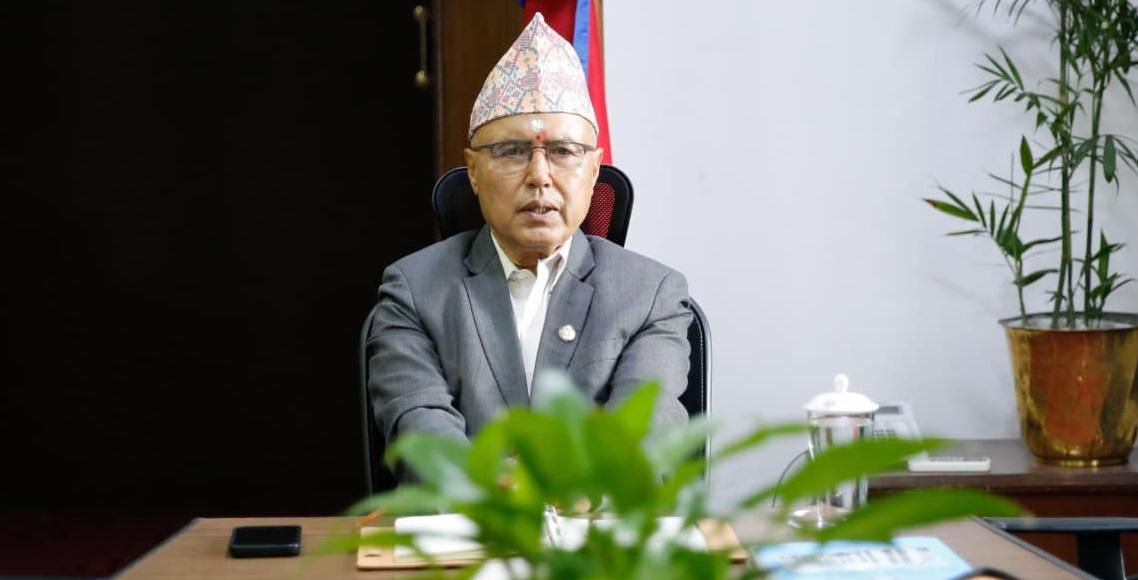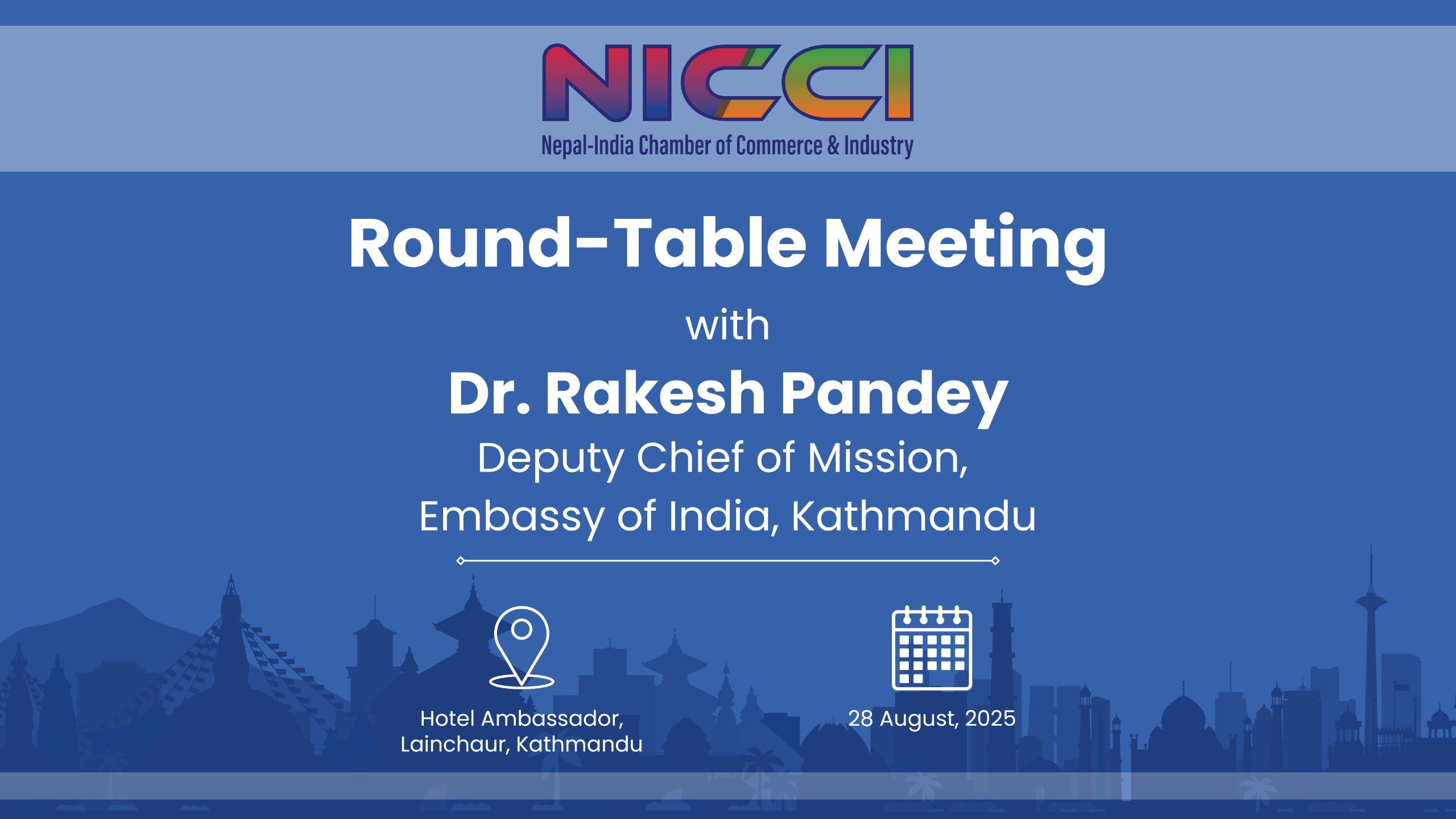NICCI appraises Finance Minister on impacts of GST reviewed by India

KATHMANDU: Nepal-India Chamber of Commerce & Industry (NICCI) appraised Finance Minister Rameshwor Khanal about the impact of General Sales Tax (GST) review by Indian government and its impact on Nepal’s manufacturing industry, the possibility of help by the Indian companies in Nepal in the reconstruction, without any reason halt of the Initial Public Offerings (IPO) by the Securities Board of Nepal (SEBON), and few of the long-standing issues regarding the foreign direct investment (FDI).
During the courtesy call today at the office of the Finance Minister at Singhadurbar led by Officiating President Kunal Kayal, NICCI also expressed the concern on the impact of the recently changed GST in India, and asked the minister to take steps to save the domestic manufacturing industries.
India’s 56th GST Council has approved broad rate changes effective from September 22. This re-bases India MRPs across several Fast-Moving Consumer Goods (FMCG) lines. Due to the change in the GST in India, it will result into widening price arbitrage (raising grey-channel risk) and improved affordability for impacted formal imports – as price ladder’s shift downwards along with India MRP revisions. “Initial workings indicate potential turnover and margin pressure, if we mirror India MRPs versus a potential price arbitrage opportunity via wholesalers if we hold Nepal pricing as-is,” a letter submitted to the Finance Minister reads.
NICCI also highlighted the inflow of illegal trade that will bleed the Nepal government as it will hurt the coffer. “Lower India MRPs + better exporter liquidity increases the incentive for retail-pack leakage into Nepal via the open border,” the letter reads, adding that expected inflow spikes in border adjacencies, with near-term cannibalization of Nepal manufactured products and adverse price perception. “Nepali industries are already disadvantaged viz-a-viz India cost model on account of added custom duties etc hence that features into pricing, however when products come through grey channel they save on customs and that benefit makes us local manufacturers extremely uncompetitive.”
Likewise, Selective formal import economics improve as India ex-factory nets fall; however, Nepal customs, VAT (which is 13 percent) and product excise remain binding. Most impacted category for example may be shampoos and Foods categories as imports become cheaper for the Nepali consumer, NICCI highlighted. “However, the local manufacturers will not see any such benefit to revise their pricing.”
Due to the change, local production could be disadvantaged, if we shadow India MRPs without equivalent tax relief, the letter submitted by NICCI reads. “Affected categories for example include soaps, toothpaste, shampoo, and food products and many others.”
It is therefore extremely important for Nepal government to take steps to protect local manufacturing and thus protect local jobs as smaller businesses could otherwise succumb to the adverse economics and might not be able to withstand such adverse economics.
NICCI has also suggested three-pronged approach to counter the change and protect the domestic manufacturing industry. “Making raw material imports cheaper (the same benefit could be passed on to consumers through pricing benefits) and/or provide production linked benefits to domestic manufacturers; increasing FG import customs to improve the incentive curve for local manufacturing; and curbing parallel flow of goods through routine and random raids in stores in bordering towns and the industry players can also help identify such outlets where such contraband products are flowing from India without any customs earning for the Nepal government, and seize India MRP stocks where outlets do not have VAT bills from a designated and registered importer.
Addressing the NICCI delegation, Finance Minister Khanal said that the major task of the incumbent government is to hold a free and fair election, and help in reconstruction. “The companies can help government by donating to the fund established by the government,” he said, adding that the long-standing issues raised by the NICCI needs new laws, which the incumbent government has no mandate. “However, I will try to facilitate the issues.”
The IPO issues will be solved by the SEBON soon, he said, adding, “The GST issue will also be looked upon.”
The NICCI delegation has the representatives from both Nepali and Indian companies including Berger Nepal, Unilever Nepal, National Insurance Company Ltd, Goldstar Shoes, hydropower projects, and many more.
भारतको जीएसटी पुनरावलोकनको नेपालमा प्रभावबारे अर्थमन्त्रीलाई अवगत गराउँदै निक्कीले दियो यस्तो सुझाव
काठमाडौंः नेपाल–भारत उद्योग वाणिज्य संघ (निक्की)ले अर्थमन्त्री रामेश्वर खनाललाई भारत सरकारद्वारा हालै गरिएको सामान्य बिक्री कर (जीएसटी) पुनरावलोकनका प्रभावहरू, त्यसको नेपालका उत्पादन उद्योगमा पर्ने असर, भारतीय कम्पनीहरूले नेपालमा पुनर्निर्माणमा सहयोग गर्न सक्ने सम्भावना, नेपाल धितोपत्र बोर्डले कारण नबताई स्थगित गरेका प्रारम्भिक सार्वजनिक प्रस्ताव (आइपीओ) र वैदेशिक लगानीसम्बन्धी केही दीर्घकालीन समस्याहरूका बारेमा जानकारी गराएको छ।
कार्यवाहक अध्यक्ष कुनाल कयालको नेतृत्वमा सिंहदरबारस्थित अर्थमन्त्रीको कार्यालयमा भएको शिष्टाचार भेटमा, निक्कीले भारतमा हालै परिवर्तन गरिएको जीएसटीको असरबारे चिन्ता व्यक्त गर्दै घरेलु उद्योगहरू जोगाउन आवश्यक कदम चाल्न अर्थमन्त्रीलाई आग्रह गरेको छ।
भारतको ५६औँ जीएसटी परिषद्ले गत सेप्टेम्बर २२ देखि लागू हुने गरी दरहरुको संशोधन स्वीकृत गरेको छ। यसअभि ४ प्रकारका दर रहेकोमा अब २ प्रकारका दर प्रयोगमा ल्याउँदै भारत सरकारले गरेको परिवर्तनले भारतका विभिन्न उपभोक्ता वस्तुहरूका खुद्रा मूल्यहरूमा पुनःआधार तय गरेको छ। भारतमा जीएसटी दर परिवर्तनले नेपालमा मूल्य अन्तर बढाउने, अनौपचारिक व्यापारको जोखिम बढाउने र आयातित वस्तुहरू अझ सुलभ बनाउने अनुमान गरिएको छ। “भारतका खुद्रा मूल्यहरू नेपालमा प्रतिबिम्बित गर्दा वा मूल्य अन्तर कायम रहँदा, खुद्रा स्तरमा बजार दबाब र कारोबार घट्ने सम्भावना देखिन्छ,” निक्कीले अर्थमन्त्रीलाई बुझाइएको पत्रमा उल्लेख छ।
निक्कीले अवैध व्यापार बढ्ने र त्यसले नेपाल सरकारको राजस्वमा प्रत्यक्ष असर पार्ने जोखिमबारे पनि चेतावनी दिएको छ। “भारतको सस्तो खुद्रा मूल्य र निर्यातकर्ताको बढी तरलताले खुला सिमानाबाट खुद्रा प्याकेजहरू नेपाल भित्रने क्रम बढ्छ,” पत्रमा भनिएको छ, “यसले सिमानाक्षेत्रमा अवैध आयात बढाउने, नेपालमा बनेका उत्पादनहरूको बिक्री घटाउने र मूल्यसम्बन्धी गलत धारणा सिर्जना गर्नेछ।”
“नेपाली उद्योगहरू पहिले नै भारतका तुलनामा उच्च लागत र भन्सार शुल्कका कारण प्रतिस्पर्धामा कमजोर छन्। तर जब सामानहरू ‘ग्रे च्यानल’ मार्फत आउँछन्, तिनीहरूले भन्सार शुल्क तिर्दैनन्, जसले गर्दा नेपालका स्थानीय उत्पादकहरूलाई अझै प्रतिस्पर्धी बन्न गारो हुन्छ।”
त्यस्तै, भारतमा कारखाना मूल्य घटेकाले केही वस्तुहरूको औपचारिक आयात अझ आकर्षक बनेको छ। तर नेपालमा भन्सार, मूल्य अभिवृद्धि कर र उत्पादन महसुल जस्ता करहरू यथावत् छन्। निक्कीका अनुसार, यसले विशेष गरी स्याम्पु र खाद्य वस्तुहरूजस्ता वस्तुहरूमा प्रत्यक्ष असर पार्नेछ, जसले गर्दा उपभोक्ताका लागि भारतबाट आयात सस्तो हुनेछ, तर स्थानीय उत्पादकहरूलाई मूल्य घटाउने कुनै अवसर हुदैन।
पत्रमा भनिएको छ, “यदि नेपालले समान कर छुट नदिई भारतका मूल्यहरू अनुसरण गर्यो भने, स्थानीय उत्पादन उद्योगहरू थप कमजोर बन्नेछन्। साबुन, टूथपेस्ट, स्याम्पु, खाद्य वस्तुहरू लगायतका धेरै श्रेणीहरू प्रभावित हुनेछन्।”
यसकारण, सरकारले स्थानीय उत्पादन र रोजगारी जोगाउन तुरुन्त कदम चाल्नु अत्यावश्यक रहेको निक्कीले जोड दिएको छ।
यसका साथै निक्कीले तीन बुँदे उपाय पनि सुझाएको छः
१. कच्चा पदार्थको आयात सस्तो बनाउने (उत्पादन लागत घटाएर उपभोक्तासम्म मूल्य लाभ पुर्याउन सकिने),
२. तयार वस्तु आयातमा भन्सार बढाउने (स्थानीय उत्पादनलाई प्रोत्साहन दिन), र
३. सिमाक्षेत्रका पसलहरूमा नियमित अनुगमन र छापामार कारबाही गरी भन्सार नतिरी भारतबाट आउने सामान रोक्ने, साथै भ्याट बिल नभएका भारतीय खुद्रा मूल्यका सामानहरू नियन्त्रण गर्ने।
भेटका क्रममा अर्थमन्त्री खनालले भने, “हालको सरकारको प्रमुख जिम्मेवारी निष्पक्ष र स्वतन्त्र निर्वाचन सम्पन्न गर्नु र पुनर्निर्माणमा सहयोग गर्नु हो। कम्पनीहरूले सरकारद्वारा स्थापन गरिएको कोषमा सहयोग गर्न सक्छन्,” भन्दै उनले निक्कलिे उठाएका दीर्घकालीन मुद्दाहरूका लागि नयाँ कानुन आवश्यक पर्ने बताए। “तर म यी विषयहरूमा सहजीकरण गर्न प्रयास गर्नेछु,” उनले भने।
निक्कीको प्रतिनिधिमण्डलमा बर्जर नेपाल, युनिलिभर नेपाल, नेशनल इन्स्योरेन्स कम्पनी लिमिटेड, गोल्डस्टार सुज, जलविद्युत् परियोजनाहरू र अन्य उद्योगका प्रतिनिधिहरूलगायत नेपाल र भारतका विभिन्न कम्पनीहरूका प्रतिनिधिहरू सहभागी थिए।

